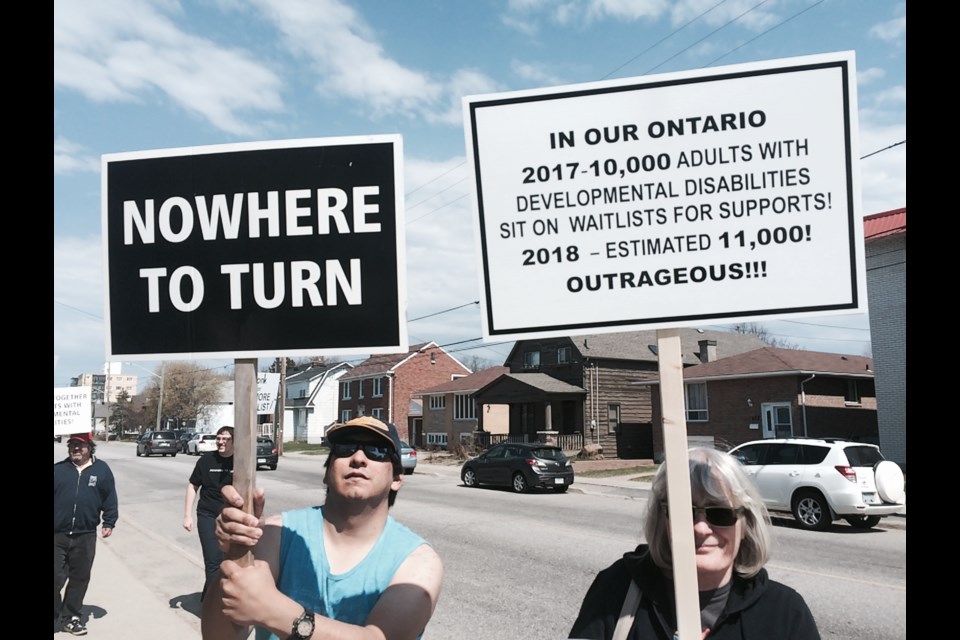Nineteen-year-old Christoper Ouellette wants the same thing most young people his age want, to live on his own.
"I would like the ability to find an apartment for myself and live independently. I'm really frustrated that I'm on a waitlist and I'm going down lower and lower. We shouldn't have to be in crisis to get support," said Ouellette.
Getting the support and housing he needs to live independently is a little more complicated than it is for most.
Ouellette lives with moderate to severe autism.
Mom, Linda Thomas-Ouellette says the current wait times for housing and support from the Ministry of Community and Social Services for adults and children with developmental disabilities is unacceptable.
"The wait list right now is 10 years or more. What am I going to do with my son for the next 10 years? I'm 68 already. It's not fair that we have to wait that amount of time for housing and supports for our children," said Ouellette.
"We can't plan for our son's future because we're stuck on wait lists. What do we do with that.?"
Once her son turned 18, the help they had been receiving ceased.
“That was a nightmare. All the special services at home stopped at 18. Now you try to explain that to a kid who is autistic that, 'sorry, I don’t have the money for that this month.' We’ve petitioned, we’re poured out our hearts. We can’t stop, and we’re not the only ones. The wait list is terrible.”
Bonnie Hart is the grandmother of an eight-year-old child with autism.
‘It’s terrible what’s happening with the children. The families have nowhere to turn. If they have to wait until they’re 18 before they can apply for housing, that means that my son will be 61, and if the wait list is 10 or more years, can you imagine how old my son is going to be, looking after a child? His old age will be spent looking after his child. If they could get on the list now, then that would be ideal.”
Sue Lowther says she’s a lot more fortunate than most because her 50-year-old daughter has been in care for 30 years.
“She doesn’t have the ability to live on her own. Now after a lot of years, she’s living with another person who needs 24-7 care, so she’s benefiting from that. We finally had her tested. We now have it in writing that she’s mentally seven years old. They can no longer put her alone in the SIL (Supported Independent Living) program. She has to have that care," explained Lowther.
"She has the body of an adult but the mind of a seven-year-old, I think she’s just lost in the system. I’m not blaming the workers, they’re doing everything they possibly can. The government needs to come up with the money to support these people, the way they deserve to be supported."
Both women joined the Ouellette family and other supporters for a noon-hour protest Wednesday called "Nowhere to Turn-Final Thrust". About a dozen people carrying signs walked in front of the Ministry of Community and Social Services building in North Bay.
"The wait list for the supports the kids will need when they get an apartment is a good six years long, and this information is from the Ministry of Community and Social Services. For the northeast region, 700 families are waiting for the support that they need for their young people to get out there and be independent."
The support families receive, are dependent on their adult child's needs.
"If our son, for instance, got set up in an apartment, he would need someone to come in to make sure he is doing his chores, getting to his job, to support him in that kind of way. Other people are going to need help just to get out of bed, so they can get going for the day. Everybody has needs unique to them."
"We met with Community and Social Services here last November. Four or five families got together. We were in tears because of the crisis that we face," explained an emotional Ouellette.
"We spent three hours talking, going over our issues, trying to help them understand what kind of situations we're all in and they promised to get back to us in a few months. We haven't heard much back."
They have put forth a number of solutions including "providing transition funding to youth entering adulthood, communicate how supports and services are available to people who have an intellectual disability and their support network, end wait lists for residential supports and end wait lists for child and adult funding."
In response, the Ministry said, "In 2017–18, the province provided $2.3 billion in annual funding for developmental services to serve approximately 47,000 people. There is growing demand for developmental services. There are several reasons for this. For example, more youth with developmental disabilities are turning 18 each year, people with developmental disabilities are living longer and more people with a dual diagnosis (mental health disorder and developmental disability) are being identified."



